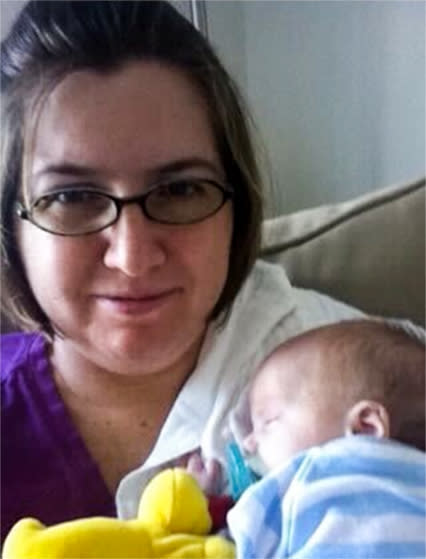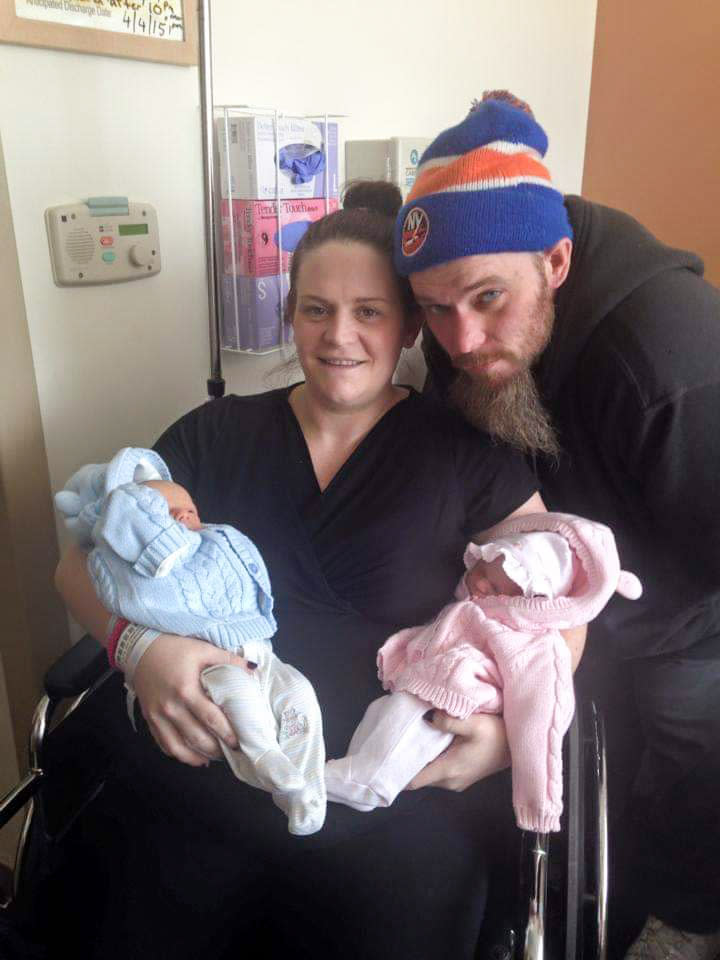Grieving parents demand online listings for Rock 'n Plays be removed before more babies die
In September 2011, Sara Thompson found her 15-week-old son Alexander unresponsive in a Fisher-Price Rock ‘n Play, his face pressed against the device’s fabric.
Nearly 12 years later, the inclined infant sleeper is associated with the deaths of about 100 babies, including Alexander. Yet Thompson, who lives in Nazareth, Pennsylvania, routinely sees the Rock ‘n Play for sale on platforms like Facebook Marketplace — despite a 2019 recall of the product. She immediately messages the sellers.
Some quickly take down their posts, saying they had no idea it had been recalled, Thompson said. But others get defensive.

“They say, ‘The product is fine, it’s the parents’ fault — they should have been watching their babies,’” said Thompson, who settled a lawsuit against Fisher-Price last year.
She is among a small group of grieving parents who’ve taken it upon themselves to curtail sales of the potentially lethal product that remains readily available online.
Their challenge reflects the shortcomings of the federal recall system, which keeps products circulating even after they’re deemed hazardous, safety advocates argue. Online platforms prolong the danger by failing to provide easy ways for users to flag recalled items if they are listed for resale, with Facebook Marketplace, in particular, lacking a clear reporting mechanism, the advocates say.
For the Rock ‘n Play, this has proven particularly perilous. At least eight deaths have been linked to the product since it was recalled in April 2019, prompting the federal Consumer Product Safety Commission to re-announce the recall in January.
But four years after all 4.7 million Rock ’n Plays were recalled, less than 10% have been returned to the manufacturer, according to a recent letter from Fisher-Price obtained by NBC News.
Babies can die in the Rock ‘n Play and other inclined sleepers when their head rolls to the fabric-covered sides of the product, or when their chin drops to their chest, restricting the airway, according to medical experts. Infants left in Rock ‘n Plays unrestrained can also roll from their back to their stomach or side, putting them in an unsafe position.
Fisher-Price says that not all deaths reported from the Rock ’n Play have been confirmed to be associated with that brand, specifically.
Under federal law, companies may decline to make recall numbers public, and Fisher-Price only provided them in response to questions from members of Congress who were alarmed about the mounting death toll.
In a letter to members of Congress last month, Fisher-Price said that it had completed more than 465,000 “cumulative corrections.” That number includes both Rock ‘n Plays that consumers returned and those that were expunged from warehouses and retail stores.
Fisher-Price also said in the letter that the company has found about 54,000 Rock ‘n Play listings online, including on Facebook Marketplace and other platforms, and 98% are now inactive after Fisher-Price worked with the websites to get them removed.
The company’s letter added that Fisher-Price had limited information about the babies who died after the recall, but that “the products were purchased by consumers before the initial recall announcement or were acquired second-hand via private sales or as gifts.”
These previously unreported details come a week after the chair of the Consumer Product Safety Commission sent letters to Facebook parent company Meta and Fisher-Price parent company Mattel demanding they do more to stop sales of secondhand Rock ‘n Plays.
From February 2022 to March 2023, CPSC staff issued nearly 4,000 takedown requests for Fisher-Price Rock ‘n Plays on secondary marketplaces, with most submitted to Facebook Marketplace, which responded swiftly to remove items, the agency said.
Nancy Cowles, executive director of consumer advocacy group Kids in Danger, said part of the problem is that sites like Facebook Marketplace don’t offer a clear way to flag recalled goods.
Facebook requires users to choose a specific reason for reporting posts, and there is no option that would fit an item that has been recalled, despite the site’s own policies prohibiting such sales.
Craigslist and eBay, by contrast, allow users to flag listings for broader reasons and also include prominent links with information about recalls.
Meta did not respond to questions about Rock ‘n Play and the lack of a specific reporting mechanism for recalls but said that it uses largely automated systems to review listings.
“We take this issue seriously and when we find listings that violate our rules, we remove them,” a Meta spokesperson said in an email.
In an interview, CPSC Chair Alexander Hoehn-Saric said the agency’s findings made clear that the recall plan that the CPSC and Fisher-Price originally agreed upon in 2019 wasn’t sufficient. Only some customers are offered refunds, while others are offered a voucher to use on other Fisher-Price merchandise. To receive either, parents are required to dismantle the sleeper and send in a specific piece of the product.
“Clearly, in retrospect, what was done then wasn’t enough,” said Hoehn-Saric, who was confirmed as chair in 2021.
Hoehn-Saric urged Fisher-Price to provide a stronger incentive for returning the products, suggesting in his letter that a full refund of all Rock ‘n Plays would be “a good start.”
That’s one reason that consumers are turning to sites like Facebook Marketplace instead, Hoehn-Saric added: “They’re getting real cash.”
Kami Snowbarger, a product safety consultant, agreed that it’s no surprise few recalled products are returned, given all the hoops that consumers must jump through to determine if they qualify for a refund and get it.
“Parents won’t take the time to do all that,” she said.
A Fisher-Price spokesperson said in a statement that it recently told the CPSC it would be willing “to increase the cash refund available to consumers who participate in the recall” but defended its efforts to take the Rock ‘n Play out of circulation.
“The company has worked diligently to remove all recalled product from the market,” it said. In its recent letter to Congress, Fisher-Price also noted that the recall participation rate for the Rock ‘n Play was in line with other recalls that the CPSC has tracked.
The company added that Fisher-Price shares the CPSC’s goal to remove the Rock ‘n Play from the market and directed consumers to its website if they have a recalled item.
But the Rock ‘n Play remains a sought-after item online: On Facebook, a recent search yielded a handful of parents in just the past few weeks looking to purchase the sleeper.
“Does anyone have a Rock N Play they want to sell?” one wrote in a post earlier this month. “It’s almost impossible to find one! Yes, I know they were recalled, but I am not worried about that.”
Kiersten Connolly, whose 6-week-old son Jameson died while sleeping in a Rock ‘n Play four years before the recall, believes the companies need to do more.

Her son’s death forced her to “learn about stuff you never want to think about,” Connolly said, including how to raise one baby while grieving another — Jameson left behind a twin sister, Dorothy — and how to special-order a coffin tiny enough for an infant.
“I could have picked up his casket in one hand,” she said.
After the 2019 recall, Connolly sued Fisher-Price and Mattel, but her suit was dismissed due to New York’s two-year statute of limitations for wrongful-death cases; her attorneys are appealing.
Connolly checks Facebook Marketplace, eBay and e-commerce platform Mercari for Rock ‘n Play listings every week. They’re not always listed as Rock ‘n Plays, so Connolly also uses other keywords, such as “inclined sleeper.” She finds them easily and pleads with the sellers to remove the listings.
“I’ve just simply said, ‘It’s not worth it. It could happen.’ It might not, it probably won’t, but it could,” she said. “And you don’t want to be me. You don’t want to go through what I’ve gone through.”
